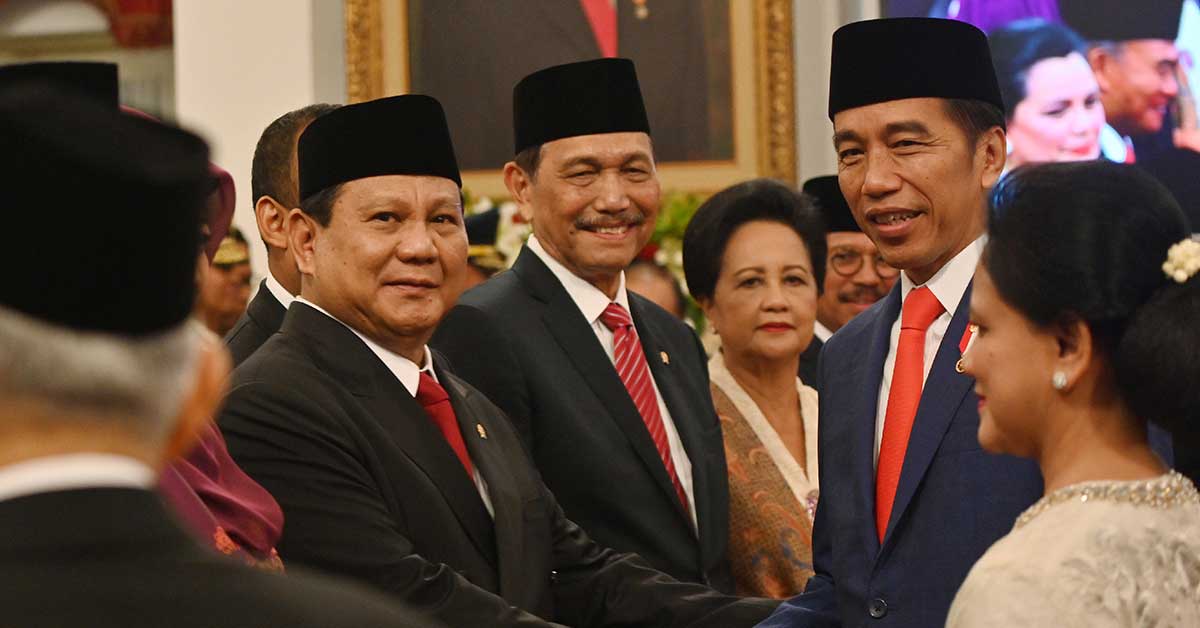Indonesian President Joko Widodo Wednesday named his election arch-rival – a former general accused of abuses – as defence minister, a move which dismayed human rights activists.
Widodo unveiled his new cabinet at an informal presentation, with more than three dozen new ministers in eye-catching batik shirts sitting in front of the imposing neoclassical columns of the Merdeka Palace.
Widodo, popularly known as Jokowi, beat Prabowo Subianto in April elections to secure another term as president of the world’s third-biggest democracy.
His victory followed a bitter campaign plagued by mudslinging, fake news online and claims from Subianto that the government staged a “massive, systematic and fraudulent” election, which sparked deadly post-poll riots. At least nine people died in the unrest.
But the pair have since appeared together in public, and this week Subianto, 68, hinted that he and another member of his Gerindra opposition party were tapped for top government posts.
Announcing Subianto’s new role, Jokowi said: “I believe I don’t have to tell him about his job – he knows more than I do.”
Online, Subianto supporters cheered the appointment.
“They used to compete but now, together, they’re going to build this country,” said one.
“We appreciate Prabowo for being big-hearted enough to be willing to help Jokowi for the progress of the nation.”
‘Dangerous for democracy’
Amnesty International Indonesia earlier warned against appointing the former general, saying it would mark “a dark day for human rights”.
Subianto, a former son-in-law of Indonesia’s late dictator Suharto, was commander of the notorious Kopassus special forces.
He was accused of abuses – including the kidnapping and disappearance of several pro-democracy activists – in the lead-up to massive street demonstrations that brought down the regime in 1998.
Subianto however has never been charged in relation to the allegations.
Subianto lost the presidential race by a whisker in 2014. But the ex-general faced an uphill battle against Widodo five years later.
During the 2019 campaign, Subianto came out as a fiery nationalist who courted Islamic hardliners and promised a boost to military and defence spending, and accused Widodo of selling the mineral-rich country to foreign interests, including China.
Critics feared that – if elected – he might try to roll back 20 years of democratic reforms, including direct presidential elections.
“This is dangerous for Indonesian democracy,” said Arya Fernandes, a researcher at the Jakarta-based Centre for Strategic and International Studies, referring to Subianto being tapped for a powerful cabinet post.
But Jokowi’s decision was likely aimed at keeping an old rival and his party in check, said Syamsuddin Haris, a political analyst at the Indonesian Institute of Sciences.
“Picking him means that he would have full support from (Subianto’s) party,” Haris said.
“It means minimising the political noise.”
Among Jokowi’s 38 ministers, former World Bank managing director Sri Mulyani Indrawati was picked to serve another term as finance minister, while Foreign Minister Retno Marsudi kept her post.
Nadiem Makarim, 35, co-founder of ride-hailing startup Gojek, was chosen to be education and culture minister. This week, Makarim announced his resignation from running a firm valued at some US$10 billion.
Media mogul Erick Thohir – a former owner of Italian football club Inter Milan – was appointed minister of state-owned enterprises.
However, fisheries minister Susi Pudjiastuti – a popular chain-smoking, tattooed politician known for blowing up illegal fishing ships caught in Indonesian waters – was not picked to continue in cabinet.
Wiranto, a 72-year-old former army chief, also did not return to cabinet as chief security minister.
Islamic State group-linked militants this month staged a failed assassination attempt on the powerful politician, who is recovering in hospital.
Jokowi and his Vice President Ma’ruf Amin were sworn-in at a heavily guarded weekend inauguration ceremony amid fears of another attack.
Indonesia, the world’s biggest Muslim-majority nation, has long struggled with Islamist militancy. – AFP
